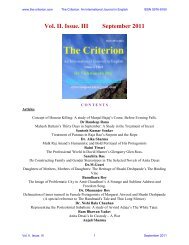Albert Camus: The Rebel Absurdist - The Criterion: An International ...
Albert Camus: The Rebel Absurdist - The Criterion: An International ...
Albert Camus: The Rebel Absurdist - The Criterion: An International ...
You also want an ePaper? Increase the reach of your titles
YUMPU automatically turns print PDFs into web optimized ePapers that Google loves.
www.the-criterion.com <strong>The</strong> <strong>Criterion</strong>: <strong>An</strong> <strong>International</strong> Journal in English ISSN 0976-8165<br />
<strong>The</strong> man who is prevented by the suffering of children from accepting faith will<br />
certainly not accept eternal life….He would accept grace unconditionally and that<br />
is why he makes his own conditions.<br />
In a world where everything is absurd, meaningless and impossible “the only<br />
ultimate significance must be one which includes, or accepts, the meaninglessness of all<br />
recognized values and concepts." <strong>The</strong>re is indeed certain heroism in the absurd hero of<br />
<strong>Camus</strong>. He doesn't despair, he doesn't hope. He is no need of any consolation. He accepts<br />
fate though he is not resigned to it. <strong>Camus</strong> believes that this revolt is the certainty of a<br />
crushing fate, without the resignation that ought to accompany it (MS: 31). It is<br />
metaphysical revolt that gives life its value "….it restores its majesty to that life. To a<br />
man devoid of blinkers, there is no finer sight than that of the intelligence at grips with a<br />
reality that transcends it" (MS: 34). He doesn't wish to be relieved of the weight of his<br />
life. He can carry it alone. He rejects the possibility that a sceptical metaphysic can be<br />
joined to an ethics of renunciation. He can drain everything to the bitter end and deplete<br />
himself. He is ready to die unreconciled. His truth consists in defiance (MS: 53). <strong>The</strong><br />
great truth of self knowledge, the truth that delivers, counts hardly for <strong>Camus</strong>. “Socrates'<br />
Know thyself has as much value as the ‘be virtuous’ of our confessionals. <strong>The</strong>y reveal a<br />
nostalgia at the same time as an ignorance. <strong>The</strong>y are sterile exercises on great subjects”<br />
(MS: 54). He can’t take the leap that Kierkegaard, Jaspers and many others ask us to take.<br />
He is too much a rationalist to betray it when it comes to encounter its limits, its<br />
impotence. <strong>The</strong> mind will be satisfied only if it can reduce Existence to terms of thought.<br />
A crude animistic anthropomorphist assumption rather than a sound philosophy is<br />
discernible in his declaration that “If man realized that the universe like him can love and<br />
suffer, he would be reconciled” (MS: 54). Nostalgia for unity and appetite for the<br />
absolute he wishes to satisfy on his own imagined terms. He drags the Absolute to his<br />
own relative and finite level. He, without caring to philosophically justify his position,<br />
assumes subject-object duality to be absolute. His following assertion is in line with the<br />
dualistic Western philosophical thought:<br />
For if, bridging the gulf that separates desire from conquest, we assert with<br />
Parmenides the reality of the One (whatever it may be) we fall into the ridiculous<br />
<strong>The</strong> <strong>Criterion</strong><br />
contradiction of a mind that asserts total unity and proves by its very assertion its<br />
own difference and the diversity it claimed to resolve. This other vicious circle is<br />
enough to stifle our hopes (MS: 54-55).<br />
<strong>The</strong> important point is that the rebel doesn’t and cannot rebel against life itself.<br />
He consents to live despite logic. As <strong>Camus</strong> quotes Ivan: “I live in spite of logic.” Logic<br />
demands suicide but neither Ivan nor <strong>Camus</strong> would accept this. Ivan will live, then, and<br />
will love as well without knowing why. When the meaning of life has been suppressed,<br />
there still remains life.” <strong>The</strong> point is what religion demands if not only life, more life,<br />
larger life.<br />
To the plea for taking the leap <strong>Camus</strong> the rebel has a polite answer:<br />
Vol. III. Issue. I 5 March 2012
















